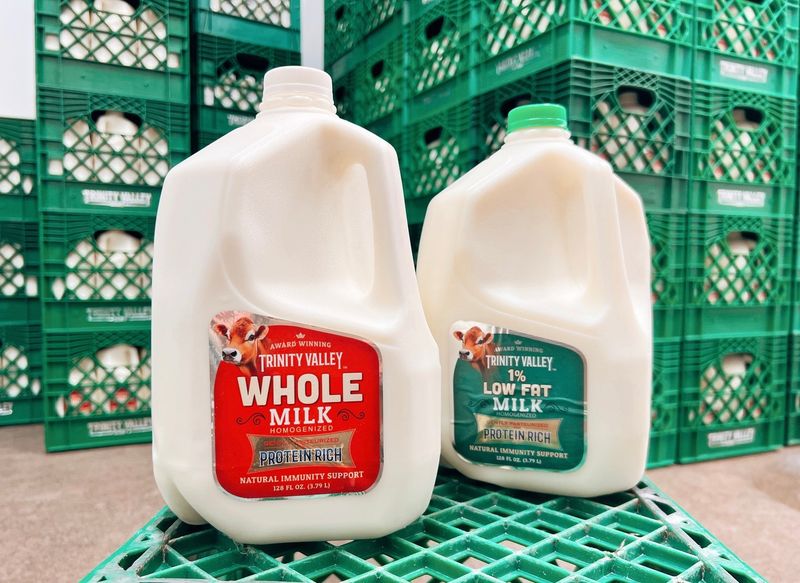When it comes to heart health, what you put in your fridge can be just as important as what you put on your plate. We often associate high cholesterol with greasy drive-thru meals or bacon-laden breakfasts, but the truth is, many of the most cholesterol-packed foods are quietly hiding in everyday kitchens. From full-fat dairy to beloved baked goods, your go-to comfort foods may be spiking your cholesterol more than you realize.
The kicker? Some of these items sound healthy—or at least harmless. Eggs, for example, are nutritional powerhouses, but their golden yolks carry a hefty cholesterol load. Shellfish like shrimp and lobster are low in saturated fat but surprisingly high in cholesterol. Even that innocent slice of cheddar cheese in your sandwich may be sneaking in more saturated fat and cholesterol than you bargained for.
Then there’s the convenience trap: deli meats, pastries, and fast food staples are quick, tasty, and everywhere—but often packed with a dangerous combination of cholesterol, saturated fat, and sodium. They might save time in the short term, but over time, they could be contributing to plaque buildup, inflammation, and higher risks for heart disease and stroke.
If you’re looking to manage your cholesterol or just eat smarter, identifying the biggest offenders in your fridge is a great place to start. This doesn’t mean giving up all the foods you love—it’s about knowing what you’re dealing with, making swaps where it counts, and learning how to enjoy the things you crave in moderation.
So before your next snack or grocery haul, take a peek inside your refrigerator and ask: are these seven sneaky cholesterol bombs waiting to sabotage your health? Let’s break them down one by one.
1. Full-Fat Dairy Products
Creamy cheeses, whole milk, and butter might taste delicious, but they’re major cholesterol culprits hiding in plain sight. A single ounce of cheddar cheese contains about 30 mg of cholesterol, while a tablespoon of butter packs around 31 mg.
Many people don’t realize that switching to low-fat versions can cut cholesterol intake significantly while still providing calcium and other nutrients. The fat in these dairy products is mostly saturated fat, which can raise your LDL (bad) cholesterol levels.
Try gradually replacing full-fat dairy with reduced-fat options. Even small changes, like using 2% milk instead of whole, can make a difference without sacrificing too much flavor in your favorite recipes.
2. Organ Meats
Grandma might have served liver and onions as a nutritious meal, but organ meats top the charts for cholesterol content.
Beef liver contains a whopping 389 mg of cholesterol per 3-ounce serving – more than an entire day’s recommended limit! Despite their cholesterol content, organ meats provide valuable nutrients like iron, vitamin B12, and vitamin A. This creates a nutritional dilemma for many health-conscious eaters who appreciate these traditional foods.
If you enjoy organ meats, consider making them an occasional treat rather than a regular meal. Pairing smaller portions with plenty of vegetables can help balance your overall dietary pattern.
3. Egg Yolks
The humble egg sits in most refrigerators, but those golden centers contain about 186 mg of cholesterol each.
For decades, eggs were considered problematic for heart health, though recent research has somewhat rehabilitated their reputation. Scientists now understand that dietary cholesterol affects blood cholesterol differently from person to person.
Eggs also provide high-quality protein, vitamins, and minerals that support overall health. For most healthy people, enjoying eggs in moderation (around 4-6 per week) likely poses minimal risk. Those with existing heart disease or diabetes might want to be more cautious and consult their doctor about appropriate egg consumption.
4. Shellfish Surprises
Shrimp and other shellfish have a reputation as fancy, healthy proteins, but they harbor a secret: significant cholesterol content. A 3-ounce serving of shrimp contains approximately 166 mg of cholesterol—more than half the daily recommended amount!
The good news? Unlike fatty meats, shellfish are low in saturated fat, which is actually more concerning for heart health than dietary cholesterol alone. They’re also packed with beneficial omega-3 fatty acids, protein, and important minerals.
Shellfish can still be part of a heart-healthy diet when prepared properly. Skip the butter sauce and deep-frying in favor of grilling, steaming, or baking with olive oil, herbs, and lemon for flavor.
5. Processed Meat Products
Hot dogs, bacon, and deli meats might make quick sandwiches, but they’re cholesterol bombs with added health concerns. Beyond their cholesterol content (around 30-40 mg per serving), these processed favorites contain sodium nitrates and high amounts of saturated fat.
The preservation methods used for these meats create compounds that have been linked to increased heart disease risk. A single slice of bacon can contain 9 mg of cholesterol, while also delivering unhealthy saturated fat and sodium.
Looking for alternatives? Try lean poultry, fish, or plant-based protein options. When you do indulge in processed meats, choose versions labeled “nitrate-free” and balance them with plenty of fruits and vegetables.
6. Fast Food Favorites
Those leftovers from your drive-thru run might be convenient, but they’re loaded with hidden cholesterol. A typical fast food cheeseburger can contain upwards of 85 mg of cholesterol, while a fried chicken sandwich might pack even more.
Fast food items typically combine multiple high-cholesterol ingredients: cheese, meat, egg, and mayo-based sauces, all in one meal. The cooking methods—usually deep-frying in reused oils—further contribute to their unhealthy profile.
When fast food is unavoidable, look for grilled options instead of fried, skip the cheese and special sauces, and consider replacing fries with a side salad. Many chains now offer nutritional information to help you make smarter choices.
7. Baked Goods and Pastries
Those tempting donuts and muffins in your fridge aren’t just sugar bombs—they’re cholesterol concerns too.
Commercial baked goods often contain eggs, butter, and shortening that drive up their cholesterol content, with some pastries containing 25-30 mg per serving. The combination of trans fats (in some commercial products) and saturated fats makes these treats particularly problematic for heart health.
Your body processes these fats in ways that can raise LDL cholesterol while lowering beneficial HDL cholesterol. Satisfy your sweet tooth with fruit-based desserts or homemade versions using healthier ingredients. Applesauce, mashed bananas, or yogurt can replace some fat in recipes, while whole grain flours add fiber that helps manage cholesterol.







Leave a comment